Graham Reid | | 9 min read
Tiffany: I Think We're Alone Now

It's a pretty ordinary kind of success
story by American showbiz standards, nothing to get too excited
about. It's your standard tale of a girl of average talent from the
suburbs north of Los Angeles who, by astute management and a radio
craving for the Next Big Thing, gets to sell four million copies of
her debut album, earn the contempt of "serious" rock
listeners and wind up in heavy litigation against her mother.
Nothing too strange in any of that when
you line it up against the careers of Janis Ian, Marilyn Monroe or
Judy Garland, all of whom were chewed up and spat out.
This time it's happening to a girl
called Tiffany Darwish. And she's only l6.
Think about it - 16.
It's late in the afternoon and on the
phone from Los Angeles Tiffany sounds very, very tired.
“Yeah . . . well,” she says slowly,
“I woke up kinda early this morning and I've been rushing all day.
I guess that is what you’re hearing in my voice. Yeah, I'm pretty
tired so right now I'm lying on the couch before I go on."
What she is waiting to go "on”
to isn’t a stage -- her live work has been very limited until
recently -- but a live television broadcast to an Australian network.
Maybe she is conserving her energy for
that broadcast or maybe she is too tired to respond, but her answers
to questions about her career come slowly and are brief.
But it is also possible she doesn't
really have all that much to say, after all it was only 10 months ago
her career started to take off. All she had known until then was high
school and studio work with her manager. And it was a mere three
months ago she first performed live with a band on, of all places, a
stage at Cinderella's Castle at Disney World, Florida.
It was an appropriate backdrop for the
Cinderella story of a singer some have likened to a cartoon
caricature of a pop star.
For the girl who began her career
singing with backing tapes in shopping malls on a Beautiful You;
Celebrating the Good Life tour in late '87, having a band was a major
step.
"That was wonderful," she
says with as much enthusiasm as her weariness will allow. "It's
definitely different having a real live guitarist there. It's a lot
of fun. I wasn't too nervous because I have a bunch of wonderful
musicians who are great guys."
But she had played with bands before
and it was through one of them she met her manager, George Tobin.
"I was in bands which would play
at barbecues or at any kind of social gathering. I was nine and
singing country songs. My parents grew up with country music and so
when you hear it and you’re about five or six you don't really
question it."
By the age of 12, she was singing
smalltime gigs and, by chance, found her way into Tobin’s recording
studio.
"At the time I was recording as a
favour to one of the bands who had helped me," she says.
Tobin liked what he heard, wooed her
away from country music and signed her as his exclusive property.
Tiffany isn’t signed to a record company, she's signed to Tobin who
delivers her albums to the record company he is signed with.
That kind of total control has led to
accusations Tobin is the puppeteer and Tiffany the puppet without a
voice and little say in her career.
“A lot of stories come out where it
looks like George is saying everything and Tiffany can't speak for
herself,” she explains. “How that came about was from different
situations where a photographer wanted to take my picture with me in
a lime green outfit an me saying I already have an image and I don't
want to wear that.
“But it's pointless for me to have an
argument with a photographer or a journalist because I walk away
looking like a jerk because I wouldn't do something.
“That's when George steps in and
says, 'She's not going to do it.' But people have a tendency to look
at that and say, ‘Look at her, she doesn't have anything to say
about it.' It's sort of like good guy, bad guy."
But when it comes to material to
record, Tobin clearly does have a big say, as she admits.
"My manager gets hold of the
material first, listens to it and then I listen to it and say how I
feel. If I really hate a song I don't have to do it, though.”
 So far Tobin has been a good picker of
material. Tiffany's cover versions of the old Tommy James hit I Think
We're Alone Now and The Beatles' I Saw Her Standing There -- with the
necessary gender change in the lyrics -- have thrust her to the top
of charts worldwide.
So far Tobin has been a good picker of
material. Tiffany's cover versions of the old Tommy James hit I Think
We're Alone Now and The Beatles' I Saw Her Standing There -- with the
necessary gender change in the lyrics -- have thrust her to the top
of charts worldwide.
And now her hectic touring schedule and
television appearances have lifted her out of high school and on to
the world stage. It's a gruelling schedule which sees her off to
Japan shortly and leaving behind the leisure time and friends.
“I take time off when I can. When I'm
on the road I have a girlfriend who comes with me. I'm flying in and
out but if I have a three-day break I fly home just to be at home.
Then I kind of lie around in my sweats on my couch. It's important
for me to spend time with my friends and also have time to myself.
"Some of my friends have been
envious of me and they’ve changed, well . . . not so much changed,
but they feel there is competition. They feel they have to compete
with me."
For a young girl whose career has been
built on the image of the girl next door, there is an irony in that
her image as the typical teenager is entirely non-competitive. "If
Tiffany can do it, so can I" is how the marketing goes. And she
is aware of it.
“Looking at my idols, I want to be like them, dress like them and dye my hair like them. But the average teenager doesn't have $200 to spend on a nice out outfit just to be like their role models. I look at people like Madonna -- which is not my image -- but when she started she had bows. You can get a bow for 25 cents and girls all over were wearing bows.
"So she started something kids
could copy because it's affordable and that' very important. You
can't have something that's real glitzy an glamorous because the kids
are just going to say, 'That's beautiful but I can't afford it.' They
want to copy the way you dress."
 Her image-conscious manager, who
insiders say guides her career ruthlessly and decides what she will
wear, has discounted any move into films, a natural career turn for
most young teen stars.
Her image-conscious manager, who
insiders say guides her career ruthlessly and decides what she will
wear, has discounted any move into films, a natural career turn for
most young teen stars.
"I think it would be rushing it to
make a movie," she says. "People would ask, 'What does she
really want to be' and say 'Just because she's successful as a singer
she thinks she can be successful in films.'
“I wouldn’t do any part different
to my image as a singer anyway. My image as a singer is just real
casual and what I feel comfortable wearing."
So far the only kink in her phenomenal
rise to stardom after the 10 shopping all appearances has been the
untidy court case over control of her finances.
For the press, and rock critics in
particular who have been almost unanimous in their contempt of
"Tiffany the Glove Puppet," the litigation has been pounced
upon.
It's a nice messy, story which can be
twisted easily as the young starlet takes her mother to court.
“A lot of papers put it out like I
was banned from going home and here’s a mother and daughter who
hate each other so much. But it wasn't like that at all. I have a
stepfather who kind of looked at this as . . . ah . . . more than
something to do at weekends," she says weighing the words
carefully.
“He saw it as something that could
pay his rent.
“You never know how long you are
going to be in this business and the main thing is to keep your head
clear and keep the money you’re working for.
“I'm only 16 and I should have some
of that money in a trust fund. That was my goal [in going to court]
because no one was taking care of that at the time. It was resolved
by a settlement."
She laughs slightly at the suggestion
while her friends hang out or watch television she has grown up fast
by sitting with lawyers and business people discussing finances.
"I try to handle all of that
stuff, but at this time I don't really want to get into having
investment advice. As far as being more mature, I think my generation
has had to grow up faster and there are a lot of pressures nowadays.
Even the style of clothing has changed and girls apply their make-up
differently to make them look older.
"I guess I'm just lucky because
I'm doing what I love to do and was able to get a career early on."
How long that career can last is another matter. Her debut album had been bled dry of singles and a new one, due in three months she says, has only had two songs recorded for it -- one of them a cover version of an old Rascals tune, Ain't Gonna Eat Up My Heart No More.
But already the media is turning the
spotlight on to Debbie Gibson and Shanice Wilson, two young singers
coming up more slowing and cautiously.
Tiffany has come a long way from
singing in shopping malls during her summer vacation. She sang at
Disney World and sold four million albums.
Sure, she’s marketed and
image-conscious. Are you going to argue The Mission, Springsteen, U2
and Tina Turner aren’t?
She’s pretty ordinary and in a way
her story could be kind of sad too one day. Think about it.
She's only 16.
 After her second album Tiffany's career
stalled, shortly after her 18th birthday she left Tobin's
management and her third album failed to chart.
After her second album Tiffany's career
stalled, shortly after her 18th birthday she left Tobin's
management and her third album failed to chart.
Later she posed nude for Playboy (right).
She's out there singing again.
For a somewhat disturbing doco about two men with a Tiffany obsession go here.
A decade later I spent a day with another teen-popette, Billie, whose life also didn't quite shape out into a music career. See here.

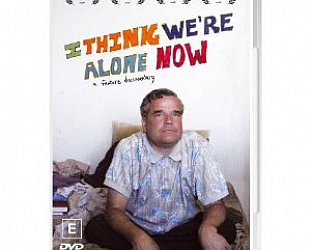
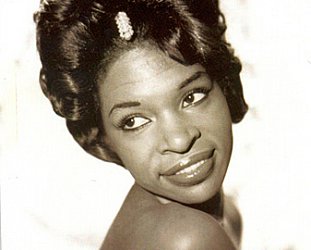
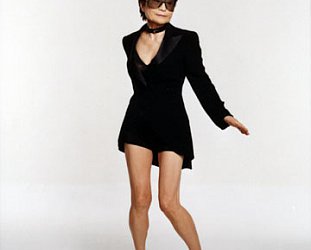
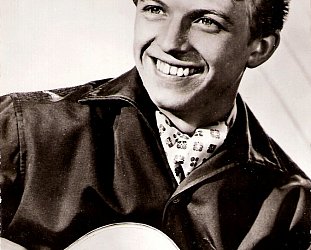
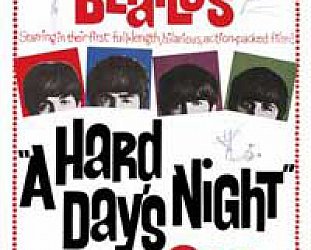

post a comment